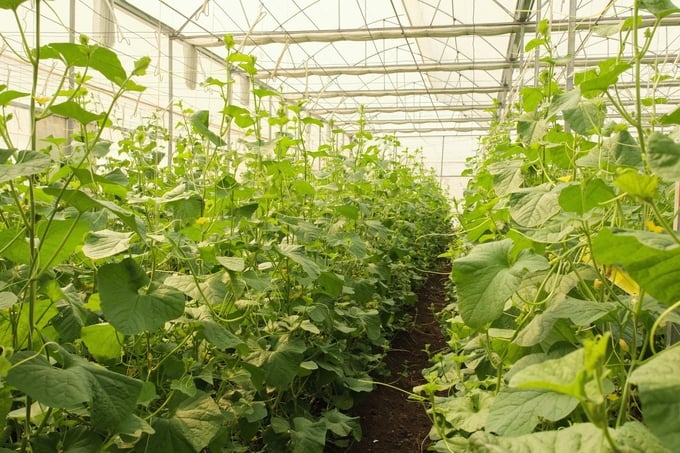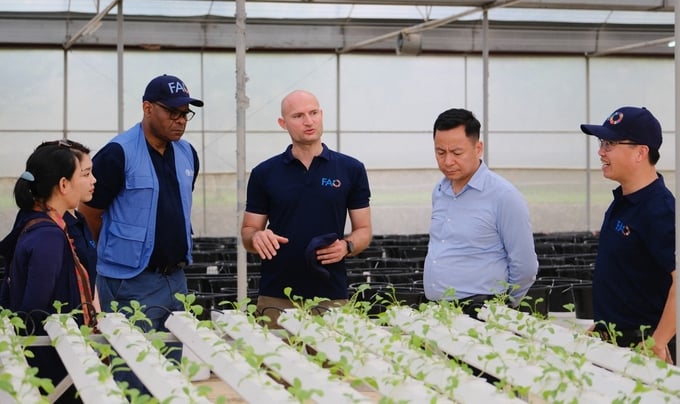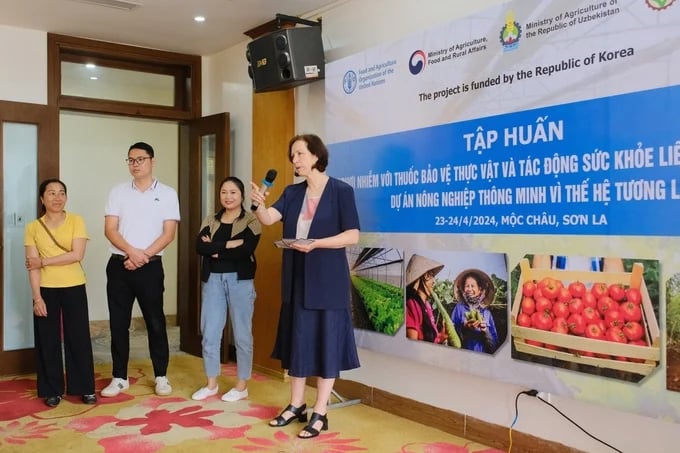May 30, 2025 | 03:28 GMT +7
May 30, 2025 | 03:28 GMT +7
Hotline: 0913.378.918
May 30, 2025 | 03:28 GMT +7
Hotline: 0913.378.918

Over 35,000 square meters of greenhouses in Moc Chau benefit from the project "Smart Agriculture for the Future Generations." Photo: Quynh Chi.
From April 22nd to 23rd in Son La, the Fruit and Vegetable Research Institute (FAVRI) and the Food and Agriculture Organization of the United Nations (FAO) in Vietnam organized a series of activities under the project "Smart Agriculture for the Future Generations." Representatives from the Department of Plant Protection (MARD), the Department of International Organizations (MOFA), and numerous farmers from Moc Chau town attended the event.
In 2021, the MARD approved the "Smart Agriculture for the Future Generations" project by the Fruit and Vegetable Research Institute. This project is funded by the Korean Government through FAO and is authorized for implementation by the Provincial People's Committee of Son La. The project comprises four main components: upgrading and renovating greenhouse systems for efficient vegetable production, providing post-harvest technology support to enhance the quality and value of vegetable products, developing guidelines for safe vegetable production in greenhouses, and establishing connections between vegetable products and the agricultural value chain.
To date, the project has supported 34 households in the Moc Chau district in renovating and optimizing their existing greenhouses. It has provided these households high-quality seedlings, fertilizers, and agricultural tools. The primary crops cultivated under this project include tomatoes, melons, cucumbers, watermelons, and bell peppers.
According to Dr. Nguyen Quoc Hung, Director of FAVRI, after three production seasons, applying high technology in greenhouse vegetable production in Moc Chau has resulted in a productivity increase ranging from 2.5 to 3 times compared to traditional farming methods.
Dr. Hung elaborated, "The adoption of new high-yield vegetable varieties has significantly enhanced economic efficiency. On average, tomato farmers now earn approximately 150 million VND per 1,000 square meters, equivalent to 1.5 billion VND per hectare. Bell pepper, a novel vegetable variety introduced to Moc Chau, yields an estimated 8 tons per hectare with an economic efficiency of 200 million VND per 1,000 square meters."
He further noted that while expanding production scale might decrease economic efficiency, it remains crucial for more farmers to benefit from the technical advancements and upgraded production facilities facilitated by the project. In the upcoming phase, FAVRI and FAO experts will introduce hydroponic vegetable growing techniques and methods for cultivating fruits and vegetables using substrates.

In the project's next phase, the FAVRI and FAO experts will introduce hydroponic vegetable growing techniques to farmers. Photo: Quynh Chi.
In sub-zone 14 (Moc Chau town), Ms. Do Thi Thuy's family is among the 34 households participating in the project, receiving training in high-tech vegetable production techniques. Since 2018, Ms. Thuy has been self-taught in organic vegetable cultivation techniques and the management of seeds, fertilizers, and pesticides. Following participation in the project, Ms. Thuy and other participating households received technical guidance from FAO experts, seeds provided by FAVRI, and support for upgrading production infrastructure.
Welcoming the FAO delegation to her greenhouse, Ms. Thuy expressed heartfelt gratitude for the project's technical support. Discussing future plans, she expressed her desire to expand the high-tech vegetable production area, intending to establish a small business and hire workers for vegetable cultivation.
In the long term, agricultural experts aim to raise farmers' awareness of the safe management and use of pesticides. This is essential for Moc Chau farmers to produce clean agricultural products and meet the increasingly stringent market requirements regarding pesticide residue levels.
Within the event's framework, specialized units collaborated to conduct the workshop titled "Pesticide Exposure and Gender-Related Health Impacts." Speaking on behalf of these units, FAO Representative in Vietnam, Mr. Rémi Nono Womdim, extended a warm welcome to the pioneering farmers producing clean vegetables in Moc Chau.
"Pesticides have long been regarded as a scientific breakthrough, crucial in enhancing crop productivity and quality. However, their overuse can adversely affect both plant and community health, diminishing pesticide effectiveness over time. According to assessments by the International Labor Organization, pesticide misuse makes agriculture one of the three most hazardous occupations, alongside construction and mineral activity," noted Mr. Rémi Nono Womdim.

Mr. Rémi Womdim, FAO Representative in Vietnam, pledged support for Vietnamese farmers in transitioning to safe and sustainable farming practices. Photo: Quynh Chi.
He stressed the urgency of "greening" the Green Revolution and expressed his hope that with FAO's assistance, Vietnamese farmers would adopt sustainable production habits, considering environmental and social impacts, particularly the interplay between economic factors, society, gender, and the right to pesticide use.
FAO research reveals that in developing countries, women are disproportionately exposed to pesticides and are more susceptible to pesticide poisoning. Most female workers in Southeast Asia lack proper equipment or protective gear. However, gender-related aspects are often overlooked in pesticide management policies and programs.
Engaging with representatives of Moc Chau farmers, female expert Nadia Correale highlighted that compared to men, women are more vulnerable to the harmful effects of pesticides due to physiological differences. Even low doses pose significant risks, potentially causing menstrual cycle disorders, drug residues in breast milk, miscarriage, breast cancer, respiratory diseases, and skin disorders, among others, depending on the frequency of exposure.
"Women have a higher percentage of adipose tissue and therefore tend to bioaccumulate lipophilic chemicals, such as persistent organic pollutants, in their fatty tissues. Pesticide exposure affects women at different stages in their lives, including adolescence, pregnancy, lactation and menopause," explained Ms. Correale.

Project beneficiaries actively engage in group activities focused on the safe use of pesticides. Photo: Quynh Chi.
Children are particularly vulnerable to the chemicals present in pesticides. When accompanying their parents to the farm, they may inhale toxic chemicals without masks. Moreover, if adults dispose of pesticide containers carelessly on grass or field edges, children may easily come into contact with chemically contaminated bottles or grass, putting their hands and mouths at risk. Farmers must consider these factors to safeguard their children from exposure to toxic substances resulting from chemical pesticides.
Consequently, the training workshop blended presentations on the principles of safe pesticide use with engaging group activities, effectively conveying risk management concepts in pesticide application to the farmer cohort, benefiting from the "Smart Agriculture for the Future Generations" project.
Ms. Tran Thi Hien from Phieng Luong, Moc Chau, will join the project in 2022 with a production area of 2,000 square meters. Through the training workshop facilitated by FAO experts, she has gained heightened awareness and expertise in protecting herself and her family during pesticide use, along with insights into gender equality in agricultural labor. Ms. Hien intends to impart her newly acquired knowledge to hired workers on her family's farm and the local women's community.
Translated by Quynh Chi
/2025/05/25/4127-3-073637_820.jpg)
(VAN) Thanks to the promotion from an FAO-implemented project, vegetable production in greenhouses in Moc Chau has seen strong development, from 1.5 hectares in 2021 to nearly 50 hectares in 2024.

(VAN) FAO has recently supported USD 140,000 to implement the project 'Risk mitigation human-animal interface risks through disease control initiatives in pig farming.'

(VAN) The People's Committee of Tra Vinh province has approved an adjustment to the investment policy for the Green Hydrogen Plant project, increasing its area to approximately 52.76 hectares.
![Reducing emissions from rice fields: [2] Farmers’ commitment to the soil](https://t.ex-cdn.com/nongnghiepmoitruong.vn/608w/files/news/2025/05/05/dsc08881jpg-nongnghiep-140632.jpg)
(VAN) Clean rice cultivation model in Thuong Tan commune, Bac Tan Uyen district, is assisting local residents in achieving sustainable agriculture by substantially reducing costs, increasing productivity, and protecting the environment.

(VAN) At the conference to disseminate Resolution No. 68, AgriS introduced its digital agricultural ecosystem and reaffirmed its commitment to accompanying the Government in promoting private sector development and sustainable agriculture.

(VAN) 'Blue Ocean - Blue Foods' initiative is designed to restore marine ecosystems and establish sustainable livelihoods for local communities by cultivating a minimum of 1,000 hectares of cottonii seaweed in the first three years.
/2025/05/21/4642-3-112707_603.jpg)
(VAN) The V-SCOPE project has made direct contributions to three out of six pillars of the Comprehensive Strategic Partnership between Vietnam and Australia.